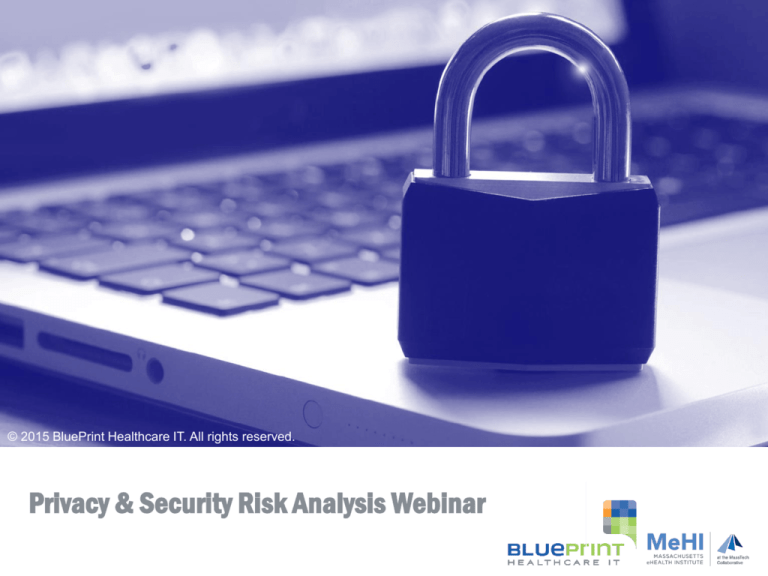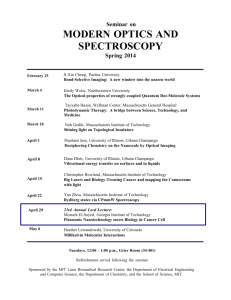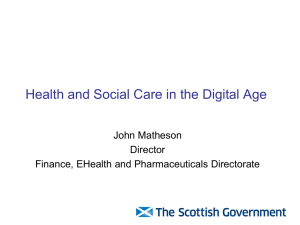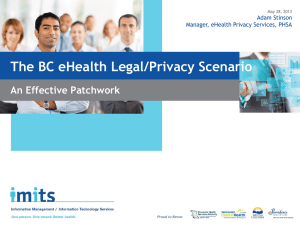
© 2015 BluePrint Healthcare IT. All rights reserved.
Privacy & Security Risk Analysis Webinar
Introduction: What We Do Matters
2
©2015 Massachusetts eHealth Institute. All Rights Reserved. Confidential.
Massachusetts eHealth Institute (MeHI)
Support healthcare providers in achieving Meaningful Use of EHR technology
Meaningful Use Gap Analysis
Registration and Attestation support
Secure document storage and audit preparation
Support providers with Physician Quality Reporting System (PQRS) reporting
Qualified registry for submitting PQRS measures
Collaborate with external partners to offer
Patient engagement resources
Privacy and security tools – BluePrint SecurityConnect
Other HealthIT resources
Engage in thought leadership
Educational outreach, informational webinars and training courses
Subject matter expertise on topics of interest to provider organizations
3
Massachusetts eHealth Institute
Disclaimer
MeHI does not take any responsibility for the
actions of physicians and their staff.
MeHI acts as your trusted advisor for meaningful
use and Health IT, and while MeHI will provide
direction and connect you to appropriate privacy
and security organizations and other services,
physicians and their staff are solely responsible to
take the steps necessary to protect the privacy
and security of protected health information.
4
©2015 Massachusetts eHealth Institute. All Rights Reserved. Confidential.
BluePrint Healthcare IT
BluePrint Healthcare IT is a recognized leader in healthcare IT
security, privacy, audit readiness, and compliance (S-PAC). Our
Security services provide a disciplined, standards-based approach
to patient and business-centered IT security and privacy risk
management.
BluePrint Healthcare IT is a firm dedicated solely to the healthcare
industry, hospitals, health Systems, ACOs, payers, and the
business associate community. We have been able to anticipate the
needs and trends for healthcare IT security, privacy and compliance
to build solutions and services that are anticipatory and relevant.
We have been leaders, nationally and locally, contributing thought
leadership and practical tools for the industry, and contribute to
national and regional working groups within HIMSS, HITRUST and
eHealth Initiative.
5
©2015 Massachusetts eHealth Institute. All Rights Reserved. Confidential.
Bio – Ryan Patrick
Ryan Patrick is the Principal Security Consultant for BluePrint Healthcare IT’s
Security, Privacy, Audit Readiness and Compliance services. With 14 years of
experience in all facets of security and information technology for both the
public and private sectors, Ryan brings an innovative perspective in protecting
information and organizational resources.
Prior to joining BluePrint, Ryan served as the Deputy Chief Information Officer
for the New York State Division of Military and Naval Affairs. In that position, he
led an effort to prepare for the Defense Information Systems Agency’s (DISA)
Command Cyber Readiness Inspection which includes assessing several key
areas: the entity’s overall information security program, the classified and
unclassified networks and the digital and physical assets used to support them.
Working as a security analyst with organizations such as Metlife and Memorial
Sloan-Kettering Cancer Center, Ryan has gained a wealth of experience
conducting risk assessments against HIPAA, ISO 27001, NIST 800-53 and PCIDSS. He currently holds an MBA from Norwich University and the Certified
Information Systems Security Professional (CISSP) certificate.
Ryan is also a Major in the New York Army National Guard serving as the Chief
Information Officer for the 42nd Infantry Division. He is combat veteran of
Operation Iraqi Freedom where he received a Bronze Star Medal, Global War
on Terrorism Expeditionary Medal and the Global War on Terrorism Service
Medal.
6
©2015 Massachusetts eHealth Institute. All Rights Reserved. Confidential.
Agenda
7
Introductions
Workshop Goals
Introduction – BluePrint & Healthcare Landscape
Regulatory/Compliance Landscape
The Hard Truth!
Security Rule
Security Risk Analysis & Management
Meaningful Use
Myths about Security Rule and Meaningful Use
MU Risk Analysis/Demo
Q&A
©2015 Massachusetts eHealth Institute. All Rights Reserved. Confidential.
Our Philosophy:
8
©2015 Massachusetts eHealth Institute. All Rights Reserved. Confidential.
Learning Objectives
After this session you will be able to:
Understand the applicable state and federal
laws/regulations
Learn how to implement the HIPAA Security Rule and
Meaningful Use (MU) in your organization
Learn how to utilize BluePrint Healthcare IT’s Security
Connect for compliance with Security Rule/Meaningful
Use
9
©2015 Massachusetts eHealth Institute. All Rights Reserved. Confidential.
Healthcare Landscape
10
Transition to electronic medical records
Exchange of health information
Meaningful Use
ICD-10
Affordable Care Organizations
OCR (HIPAA) and CMS (Meaningful Use) Audits
State and Federal Laws/Regulations (including penalties)
©2015 Massachusetts eHealth Institute. All Rights Reserved. Confidential.
Massachusetts – 201CMR17.00
This regulation establishes minimum
standards to be met in connection
with the safeguarding of personal
information contained in both paper
and electronic records.
The objectives of this regulation are:
to ensure the security and
confidentiality of customer
information in a manner fully
consistent with industry standards
protect against anticipated threats
or hazards to the security or integrity
of such information
protect against unauthorized access
to or use of such information that
may result in substantial harm or
inconvenience to any consumer
11
©2015 Massachusetts eHealth Institute. All Rights Reserved. Confidential.
Not only Protected Health
Information (PHI)
Paper or Electronic forms
Is not a breach unless used in
unauthorized manner
First Initial AND Last Name,
PLUS:
•
Social Security Number
•
State-Issued ID (Driver’s
License, Photo ID)
•
Account Number (even
without PIN)
Massachusetts – 201CMR17.00
Every person that owns or licenses personal information about a
resident of the Commonwealth shall develop, implement, and
maintain a comprehensive information security program that is written
in one or more readily accessible parts and contains administrative,
technical, and physical safeguards.
The comprehensive security program must include:
Designating one or more employees to maintain the program
Identifying and assessing reasonably foreseeable internal and external risks to the
security, confidentiality, and/or integrity of any electronic, paper or other records
containing personal information
Developing security policies for employees relating to the storage, access and
transportation of records containing personal information outside of business
premises.
12
©2015 Massachusetts eHealth Institute. All Rights Reserved. Confidential.
Massachusetts – 201CMR17.00
The comprehensive security program must include (cont):
Imposing disciplinary measures for violations of the program rules.
Preventing terminated employees from accessing records containing personal
information
Third-party service providers that are capable of maintaining appropriate security
measures to protect such personal information
Reasonable restrictions upon physical access to records containing personal
information, and storage of such records and data in locked facilities, storage areas
or containers.
Regular monitoring to ensure that the program to prevent unauthorized access to
or unauthorized use of personal information
Reviewing the scope of the security measures at least annually or whenever there
is a material change in business practices
Mandatory post-incident review of events and actions taken, if any, to make
changes in business practices relating to protection of personal information.
13
©2015 Massachusetts eHealth Institute. All Rights Reserved. Confidential.
201CMR17.00 17.04
The comprehensive information security program must ensure the
establishment and maintenance of a security system covering its
computers, including any wireless system, that, at a minimum, and to
the extent technically feasible, shall have the following elements:
User authentication
Access control
Encryption (Network)
System Monitoring
Encryption (Media)
Patch Management (Internet-facing)
Malware
Education
14
©2015 Massachusetts eHealth Institute. All Rights Reserved. Confidential.
Massachusetts 201CMR17.00 Breach Notification
“A person who owns or licenses
personal information knows or has
reason to know of (1) a security
breach, or (2) that the personal
information of a Massachusetts
resident was acquired or used by an
unauthorized person or for an
unauthorized purpose, that person
must notify the Attorney General and
the Office of Consumer Affairs and
Business Regulation.”
* Consumer Affairs and Business Regulation
website: http://www.mass.gov/ocabr/data-privacyand-security/data/requirements-for-security-breachnotifications.html
15
©2015 Massachusetts eHealth Institute. All Rights Reserved. Confidential.
The notifications to the Office of
Consumer Affairs and Business
Regulation and to the Attorney General
must include:
A detailed description of the nature and
circumstances of the breach of security or
unauthorized acquisition or use of personal
information;
The number of Massachusetts residents
affected as of the time of notification;
The steps already taken relative to the incident;
Any steps intended to be taken relative to the
incident subsequent to notification; and
Information regarding whether law enforcement
is engaged investigating the incident.
Knowledge Check
What types of information are considered personal information
according to Massachusetts 201CMR17.00?
First Initial AND Last Name, PLUS:
16
Social Security Number
State-Issued ID (Driver’s License, Photo ID)
Account Number (even without PIN)
©2015 Massachusetts eHealth Institute. All Rights Reserved. Confidential.
Federal Law/Regulations
Applicable Federal Law and/or Regulations include:
HIPAA
HITECH
OMNIBUS
*Systems and controls should comply with most stringent requirements
17
©2015 Massachusetts eHealth Institute. All Rights Reserved. Confidential.
HIPAA & HITECH Background
HITECH (Health Information Technology for Economic and
Clinical Health): enacted on February 17, 2009.
Part of the American Recovery & Reinvestment Act (ARRA)
Revised HIPAA (Health Insurance Portability and Accountability Act) rule:
tougher provisions for security, privacy and enforcement.
Increased maximum penalties:
•
$50,000 per incident
•
$1.5M for the year (willful neglect concept)
Reporting requirements for security breaches
•
Media outlets, US Department of Health and Human Services, victims
Ability for state Attorney General to bring legal action against physicians
and hospitals for non-compliance
18
Individual Liability for criminal violations
©2015 Massachusetts eHealth Institute. All Rights Reserved. Confidential.
Violations = Penalties
Violation Category
Per Violation
Maximum Penalty Per Year
$100 - $50,000
$1.5 M
$1,000 - $50,000
$1.5 M
Violation due to willful neglect
but corrected within 30 days of
discovery of the violation.
$10,000 - $50,000
$1.5 M
Violation due to willful neglect
and not corrected within 30
days of discovery.
$50,000
$1.5 M
Violation was not known and
the organization would not
have known by exercising
reasonable diligence.
Violations due to reasonable
cause but not willful neglect.
19
©2015 Massachusetts eHealth Institute. All Rights Reserved. Confidential.
HITECH – New Provisions
Business Associates and subcontractors are now subject to HIPAA
requirements (“Chain of Trust”)
Restrictions on Research, Marketing, Fundraising, Sale of patient
information
Increased patient rights to restrict disclosure of PHI
Business Associate Agreements must be revised to include
language that covers HITECH & OMNIBUS
Length of time information is considered PHI
Accounting of Disclosures to include TPO
(Treatment, Payment and Operations)
20
©2015 Massachusetts eHealth Institute. All Rights Reserved. Confidential.
OMNIBUS – New Provisions
Expanded Business Associate (BA) definition
Third-Party Risk Assessments
Strengthened “harm” provision
• Assumption of harm unless proven otherwise
Genetic Information Nondiscrimination Act (GINA)
• Genetic information is protected under the HIPAA Privacy
Rule
21
©2015 Massachusetts eHealth Institute. All Rights Reserved. Confidential.
The Hard Truth!
You may be wondering…
Why are you telling me all of this?
What does this mean to me?
Why are we here?
22
©2015 Massachusetts eHealth Institute. All Rights Reserved. Confidential.
Ponemon Institute 2014 Cost of Data Breach Study: Global Analysis
23
©2015 Massachusetts eHealth Institute. All Rights Reserved. Confidential.
Ponemon Institute 2014 Cost of Data Breach Study: Global Analysis
THIS is why we are here…
24
©2015 Massachusetts eHealth Institute. All Rights Reserved. Confidential.
Ponemon Institute 2014 Cost of Data Breach Study: Global Analysis
25
©2015 Massachusetts eHealth Institute. All Rights Reserved. Confidential.
Ponemon Institute 2014 Cost of Data Breach Study: Global Analysis
26
©2015 Massachusetts eHealth Institute. All Rights Reserved. Confidential.
HHS Breach Notification Site
There have been 1,142 reported breaches of 500 records or more since
October 21, 2009
https://ocrportal.hhs.gov/ocr/breach/breach_report.jsf
27
©2015 Massachusetts eHealth Institute. All Rights Reserved. Confidential.
Settlements Reached with HHS
28
©2015 Massachusetts eHealth Institute. All Rights Reserved. Confidential.
Settlements Reached with HHS
29
©2015 Massachusetts eHealth Institute. All Rights Reserved. Confidential.
HIPAA – Security Goal
Privacy and security is the
responsibility of physicians
and their staff.
30
©2015 Massachusetts eHealth Institute. All Rights Reserved. Confidential.
HIPAA Security Risk Analysis – General Categories
ADMINISTRATIVE SAFEGUARDS
PHYSICAL SAFEGUARDS
31
Security Management Process
Assigned Security Responsibility
Workforce Security
Information Access Management
Security Awareness and Training
Security Incident Procedures
Contingency Plan
Evaluation
Business Associate Contracts and Other
Arrangements
©2015 Massachusetts eHealth Institute. All Rights Reserved. Confidential.
Facility Access Control
Workstation Use
Workstation Security
Device and Media Controls
TECHNICAL SAFEGUARDS
Access Control
Audit Controls
Integrity
Person or Entity Authentication
Transmission Security
HIPAA Security Risk Analysis – General Categories
ORGANIZATIONAL REQUIREMENTS
Business associate contracts or other arrangements
Requirements for Group Health Plans
POLICIES AND PROCEDURES AND DOCUMENTATION
REQUIREMENTS
32
Written policies and procedures to assure HIPAA security compliance
Documentation of security measures
©2015 Massachusetts eHealth Institute. All Rights Reserved. Confidential.
HIPAA Security Rule – Risk Management
Under the Administrative safeguards, a covered entity must:
Establish and maintain a Security management process.
Implement policies and procedures to prevent, detect, contain, and
correct security violations.
• Implementation specifications:
Risk analysis (Required). Conduct an accurate and
thorough assessment of the potential risks and
vulnerabilities to the confidentiality, integrity, and
availability of electronic protected health information held
by the covered entity.
Risk management (Required). Implement security
measures sufficient to reduce risks and vulnerabilities to a
reasonable and appropriate level
33
©2015 Massachusetts eHealth Institute. All Rights Reserved. Confidential.
HIPAA Security Rule – Risk Analysis Guidance
Health and Human Services issued guidance for conducting the
required risk analysis:
Scope
Data Collection
Identify and document threats and vulnerabilities
Assess current security measures
Determine likelihood of threat occurrence
Determine potential impact of threat occurrence
Determine level of risk
Finalize documentation
Periodic review and updates to the risk analysis
*http://www.hhs.gov/ocr/privacy/hipaa/administrative/securityrule/radraftguidance.pdf
34
©2015 Massachusetts eHealth Institute. All Rights Reserved. Confidential.
HIPAA Security Rule – Risk Management Process
Take-aways
Know how and where your organization is at risk and determine
the appropriate strategy
Implement continuous risk management process
35
©2015 Massachusetts eHealth Institute. All Rights Reserved. Confidential.
HIPAA Security Rule and Meaningful Use
In order to qualify under the Centers for Medicare and Medicaid
Services (CMS) EHR incentive program, providers have to show
that they are meaningfully using their EHRs by meeting thresholds
for a number of objectives. The EHR Incentive Programs are
phased in three stages* with increasing requirements.
Each phase includes the standards of conducting a Security Risk
Analysis in accordance with the HIPAA Security Rule.
36
©2015 Massachusetts eHealth Institute. All Rights Reserved. Confidential.
Meaningful Use – Stage 1
Stage 1 of the CMS EHR Incentive Program began in 2011. It
sets the basic functionalities for EHRs. The requirements are
focused on providers capturing patient data and sharing that data
either with the patient or with other healthcare professionals.
37
©2015 Massachusetts eHealth Institute. All Rights Reserved. Confidential.
Meaningful Use – Stage 2
Stage 2 of the CMS EHR Incentive Program began in 2014. It
uses advanced clinical processes. The requirements are focused on
health information exchange between providers and promote patient
engagement by giving patients secure online access to their health
information.
38
©2015 Massachusetts eHealth Institute. All Rights Reserved. Confidential.
Meaningful Use – Stage 3
Stage 3 of the CMS EHR
Incentive Program is scheduled to
begin in 2016 but the rule has not
been finalized. Policy and
Standards committees are
developing recommendations to
continue to expand meaningful
use objectives to improve health
care outcomes.
39
©2015 Massachusetts eHealth Institute. All Rights Reserved. Confidential.
10 Myths of Security Rule and Meaningful Use
Myth
40
©2015 Massachusetts eHealth Institute. All Rights Reserved. Confidential.
Fact
10 Myths of Security Rule and Meaningful Use
Myth
41
©2015 Massachusetts eHealth Institute. All Rights Reserved. Confidential.
Fact
10 Myths of Security Rule and Meaningful Use
Myth
42
©2015 Massachusetts eHealth Institute. All Rights Reserved. Confidential.
Fact
10 Myths of Security Rule and Meaningful Use
Myth
43
©2015 Massachusetts eHealth Institute. All Rights Reserved. Confidential.
Fact
Knowledge Check
How often should I complete my Security Risk Analysis?
A full security risk analysis should be performed when you adopt an EHR.
Thereafter, you should update the prior analysis for changes in risks
every year, or whenever changes to your practice or electronic systems
occur.
To comply with HIPAA, you must continue to review, correct, modify, and
update security protections. Under the Meaningful Use Programs,
Eligible Professionals must conduct a security risk analysis prior to or
during their EHR reporting period. A new review must be completed for
each subsequent EHR reporting period. A security update is required if
any security deficiencies were identified during the risk analysis.
44
Massachusetts eHealth Institute
Knowledge Check
My EHR vendor conducted a Security Risk Review. Is this
sufficient to meet the Meaningful Use Core Measure?
Your EHR vendor may be able to provide assistance and training on the
privacy and security aspects of the EHR. However, for Meaningful Use, it
is your responsibility to complete a thorough security risk analysis, and to
implement a plan to mitigate any security risks. Be sure to review not only
your EHR hardware and software, but all electronic devices that store,
capture, or modify electronic Protected Health Information (PHI). In
addition, while your mitigation plan could include updates to your EHR
software, it should also include changes in workflow processes or storage
methods, and any other corrective action necessary to eliminate the
security deficiencies identified in the risk analysis.
45
Massachusetts eHealth Institute
Knowledge Check
My organization has multiple locations. Do we need to conduct
a separate Security Risk Analysis for each location?
A thorough Security Risk Analysis should take into account all of the
electronic devices that store, capture, or modify electronic Protected
Health Information (PHI). Because this may vary by location, a generic,
organization-wide SRA may be insufficient. Your SRA should take into
account all the variables that may impact the security of PHI for each
specific location.
46
Massachusetts eHealth Institute
Risk Analysis – SecurityConnect Demo
MeHI’s instance of SecurityConnect can be
found at the following link:
https://securityconnect.bphitapps.com/mehi
47
©2015 Massachusetts eHealth Institute. All Rights Reserved. Confidential.
MeHI Membership
Type of Service
# Providers
Pricing per
Provider
Pricing per
Practice
Remote MU Support
1 to 10
$699
NA
Remote MU Support
11 to 49
$629
NA
Remote MU Support
50+
Premium Services
NA
Type of Service
Privacy and Security Workshop
(includes access to SecurityConnect Tool)
SecurityConnect Tool
48
Massachusetts eHealth Institute
(10% discount)
$559
(20% discount)
NA
NA
$500
MeHI Members Non-members
Free
$499/Provider
Free
-
Join our Upcoming Workshop
The #1 reason providers are failing Meaningful Use audits
is due to inadequate Security Risk Analysis
Get on track with your Security
Risk Assessment and attest to
Meaningful Use with MeHI’s
support & solutions:
Assess your practice’s privacy
and security status
Develop remediation plans to
resolve gaps
Communicate resolution steps
to the providers involved
Track progress in addressing
outstanding issues
Demonstrate compliance
49
©2015assachusetts eHealth Institute. All Rights Reserved. Confidential.
Privacy & Security Workshop
Wednesday April 22, 2015
Cost: Free to MeHI Members
$499 for non-members
Q&A
Questions?
50
©2015 Massachusetts eHealth Institute. All Rights Reserved. Confidential.
Contact Us
MeHI eHealth Services and Support
1-855-MASS-EHR
massehr@masstech.org
mehi.masstech.org
Thomas Bennett
Client Services Relationship Manager
(508) 870-0312 ext. 403
tbennett@masstech.org




